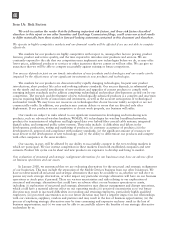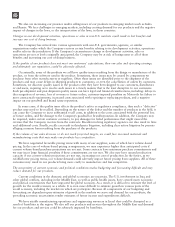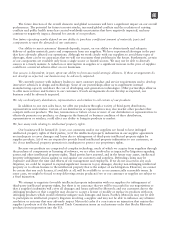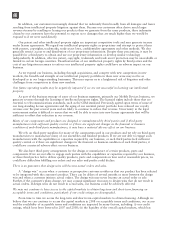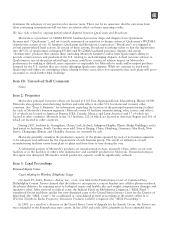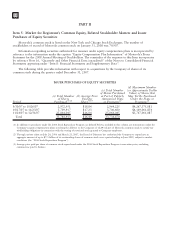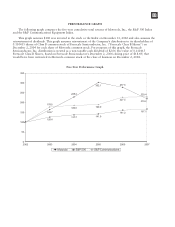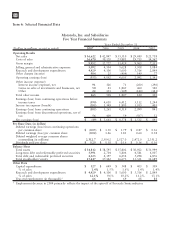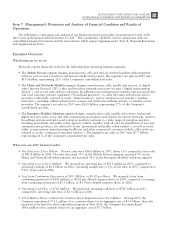Motorola 2007 Annual Report Download - page 36
Download and view the complete annual report
Please find page 36 of the 2007 Motorola annual report below. You can navigate through the pages in the report by either clicking on the pages listed below, or by using the keyword search tool below to find specific information within the annual report.
complaints to add allegations that cellular telephones sold without headsets are defective because they present a
safety risk when used while driving and to seek punitive damages. Plaintiffs in Farina also seek declaratory relief
and treble and statutory damages. After the Farina complaint was amended, on February 17, 2006, a newly-added
defendant to the Farina case removed the case to federal court. After initial consolidation with the MDL
Proceeding, on June 11, 2007, the MDL Panel transferred Farina back to the federal district court in Philadelphia.
Plaintiffs’ motion to remand to Pennsylvania state courts was denied on February 13, 2008. The federal district
court requested that defendants refile and rebrief their motions to dismiss.
On September 9, 2002, Dahlgren v. Motorola, Inc., et al., was filed in the D.C. Superior Court containing
class claims alleging deceptive and misleading actions by defendants in falsely stating that cellular phones are safe
and by failing to disclose studies that allegedly show cellular phones can cause harm. Dahlgren seeks injunctive
and equitable relief, actual damages, treble or statutory damages, punitive damages and a constructive trust. On
December 9, 2005, plaintiff filed an amended complaint in Dahlgren. Defendants moved to dismiss Dahlgren on
February 3, 2006. That motion is still pending.
During 2001 and 2002, several cases were filed in the Superior Court of the District of Columbia alleging that
use of a cellular phone caused a malignant brain tumor: Murray v. Motorola, Inc., et al., filed November 15, 2001,
Agro, et al. v. Motorola, Inc., et al., filed February 26, 2002; Cochran, et al. v. Audiovox Corporation, et al., filed
February 26, 2002, and Schofield, et al. v. Matsushita Electric Corporation of America, et al., filed February 26,
2002,. Each complaint seeks compensatory damages in excess of $25 million, consequential damages in excess of
$25 million and punitive and/or exemplary damages in excess of $100 million. These cases were removed to
federal court and transferred to the United States District Court for the District of Maryland (the “MDL Court”).
On July 19, 2004, the MDL Court found that there was no federal court jurisdiction over Murray, Agro, Cochran
and Schofield and remanded those cases to the Superior Court for the District of Columbia. On November 30,
2004, defendants moved to dismiss the Murray, Agro, Cochran and Schofield complaints. On August 24, 2007, the
Superior Court for the District of Columbia granted the defendants’ motion and dismissed the cases with prejudice
on federal preemption grounds. On September 20, 2007, plaintiffs appealed the dismissal to the District of
Columbia Court of Appeals and that appeal is still pending.
Iridium-Related Cases
Class Action Securities Lawsuits
Motorola has been named as one of several defendants in putative class action securities lawsuits arising out
of alleged misrepresentations or omissions regarding the Iridium satellite communications business which, on
March 15, 2001, were consolidated in the federal district court in the District of Columbia under Freeland v.
Iridium World Communications, Inc., et al., originally filed on April 22, 1999. Plaintiff’s motion for class
certification was granted on January 9, 2006 and the trial is scheduled to begin on May 22, 2008.
Bankruptcy Court Lawsuit
Motorola was sued by the Official Committee of the Unsecured Creditors of Iridium (the “Committee”) in the
Bankruptcy Court for the Southern District of New York on July 19, 2001. In re Iridium Operating LLC, et al. v.
Motorola asserts claims for breach of contract, warranty, fiduciary duty and fraudulent transfer and preferences,
and seeks in excess of $4 billion in damages. On September 20, 2007, following trial on the solvency and capital
adequacy portion of the Committee’s fraudulent transfer and preference claims, the Iridium Bankruptcy Court
granted judgment for Motorola on all those claims. The remaining claims for breach of contract, warranty,
fiduciary duty and equitable subordination remain pending.
On March 30, 2001, the United States Bankruptcy Court for the Southern District of New York presiding
over the Iridium bankruptcy proceeding approved a settlement between the unsecured creditors of the Iridium
Debtors and the Iridium Debtors’ pre-petition secured lenders. The settlement agreement creates and provides for
the funding of a litigation vehicle for the purpose of pursuing litigation against Motorola. Motorola appealed the
approval of the settlement first to the United States District Court for the Southern District of New York and
thereafter to the United States Court of Appeals for the Second Circuit. On March 5, 2007, the Court of Appeals
vacated the District Court order approving the settlement and directed that the case be remanded to the Iridium
Bankruptcy Court for further proceedings. On June 1, 2007, the Unsecured Creditors Committee filed with the
bankruptcy court a renewed motion for approval of the Settlement Agreement, to which Motorola objected. That
motion remains pending.
28


